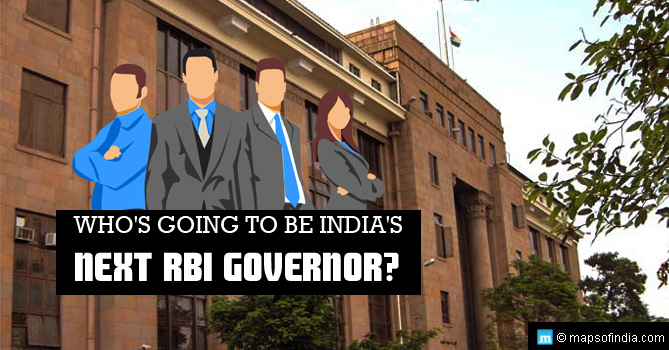IIT, IIM, and MIT Solan School of Management alumni , Dr Raghuram Rajan was roped in to serve as the Governor of the RBI (by the UPA government) in 2013. Rajan, former IMF Chief Economist, took on this role with elan on 4 September 2013. Taking over at a time when the rupee was in a freefall against the dollar and the domestic inflation rates were skyrocketing, Rajan’s deft maneuvering is largely responsible for pulling the economy out of a major crisis. He enjoys the respect of the people, the media, and corporate India as well. Despite rather overwhelming public opinion Rajan declined to continue as RBI Governor for a second term.
Rajan’s exit is mired in controversy. Despite a successful 2 year stint with the NaMo government, his alleged differences with the Finance Minister have been cited as the reason Rajan did not choose to continue as the RBI governor. This has also become one of the main criticisms levied against PM Modi and his cabinet. The PM and the FM, however, have only praised Rajan for his exemplary work over the past two years and Rajan has expressed a desire to return to the world of academics. Whatever the reason, Rajan’s exit is now a certainty and we must look forward to the new head of India’s central bank.
India’s RBI plays an important advisory role when it comes to determining the government’s financial policy. As far as the banking sector goes, the RBI chief plays a very significant role in determining the credit rates and banking policies and thus influences India Inc. as well. In a country where the battle with inflation is waged on a month-on-month basis, the personality and the principles of the RBI chief are likely to determine the economic outlook of the country.
By the end of June 2016, the government presented its list of four shortlisted candidates for the role of RBI Governor. The name of the next RBI Governor will be announced following PM Modi’s trip to Africa. Here’s a snapshot of the profiles of the shortlisted candidates.
Urjit Patel
Dr Urjit Patel is currently one of RBI’s four deputy governors. Patel is in his second tenure in this role, having joined RBI in January 2013 and looks after monetary policy, economic policy, research and information management, and right to information. Patel was Rajan’s colleague at the IMF in Washington and later as colleagues at RBI, the two were quite close. Patel is a person known to take tough, often controversial stances. Patel broke into the headlines as the head of a committee that proposed a number of landmark changes including the change to CPI (consumer price inflation) instead of WPI (Wholesale Price Index) and inflation targeting. Patel has been instrumental in driving a number of monetary policy reforms in recent times.
Patel graduated from the London School of Economics and went on to receive his MPhil from Oxford University in 1986. He later received his doctorate from Yale University.
Rakesh Mohan
Like Patel, Dr Rakesh Mohan is also a RBI veteran, having served two stints as a Deputy Governor between September 2002 and October 2004, and again between July 2005 and June 2009. Born in 1948, Mohan has served in various advisory roles with the government of India right from the 1990s. He served as the Economic Affairs Secretary with the Finance Ministry between 2004 and 2005. Mohan’s expertise in economic policy matters dates back to his second term as RBI Deputy Governor when the global financial crisis plunged many economies into a dark phase. Mohan and YV Reddy are largely responsible for insulating the domestic economy from the ravages of the global economic crisis. Mohan has also served as the Executive Director of the IMF in 2012.
Mohan received his B.Sc in Electrical Engineering from Imperial College (University of London), a BA from Yale University and Ph. D in Economics from Princeton.
Subir Gokarn
Like Patel and Mohan, Dr Subir Gokarn was also a Deputy Governor of the Reserve Bank of India. He served between November 2009 and January 2013. Gokarn succeeded Mohan both as Dy Governor RBI (2009) and as Executive Director on the board of the International Monetary Fund (2015). Apart from being the youngest RBI Deputy Governor, Gokarn is also considered one of the finest economists of the country. He served as the Chief Economist of Standard and Poor (S&P), the global rating agency and also headed the Research and Information unit of CRISIL. Dr Gokarn also worked as the associate professor at the Mumbai-based Indira Gandhi Institute of Development Research.
Gokarn received his BA in Economics from St Xavier’s College in Mumbai and his MA in Economics from Delhi School of Economics. He later received his Ph. D from the Case Western Reserve University in Cleveland, Ohio.
Arundhati Bhattacharya
If Arundhati Bhattacharya, the serving Chairperson-Managing Director of the country’s largest public bank, the State Bank of India is chosen to be the next RBI Governor, she shall be the first woman to hold the post. From her recruitment as a probationary officer (1977) to the head of SBI (since 2013), Bhattacharya’s rise has been a phenomenal one. In 2014, the Bloomberg Magazine listed Bhattacharya among the 50 Most Influential people in global finance and the Forbes magazine ranked her as the fifth most powerful woman in the world of finance. She ranked 25th in the Forbes’ list of ‘The World’s 100 Most Powerful Women’. Though her exposure to economic policy matters is rather minimal, Bhattacharya has been part of India’s banking transformation and has overseen the massive expansion and tech upgradation of SBI over the years. She has been deftly maneuvering the state bank through a particularly difficult bad loan crisis.
Bhattacharya studied English in Kolkata’s prestigious Lady Brabourne College and at Jadavpur University.





